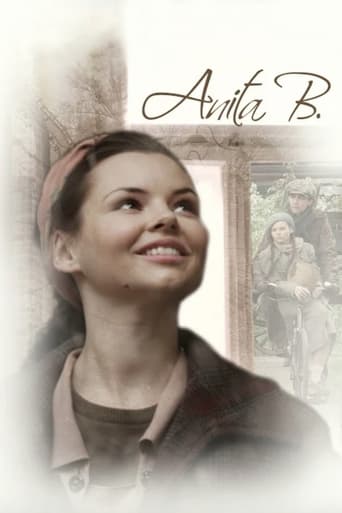

Anita B. (2015)
After World War II, Anita, a young survivor of Auschwitz, becomes involved in an intense and passionate affair that almost shatters her until she gains the strength to start a new life.
Watch Trailer
Cast


Similar titles
Reviews
An intense and heartfelt movie, the story of Anita B immediately captures the attention of the viewer. Anita B is the story of a young girl who has just been rescued from the horrors of Auschwitz by the Red Cross. The movie opens showing a Red Cross van driving across the beautiful, but desolate and snowy mountains. Soon the complex and intriguing character Eli appears to escort Anita back to her new home. Anita's new life commences in the house of her only living relative: her aunt, Monika. Having lost both her parents in Auschwitz, Anita struggles to honor her aunt's request to avoid mentioning the horrors she witnessed. We even learn that Anita was loath to leave Auschwitz as her parents had not survived. Anita does not want to forget her parents and thus confides in little baby Roby about her past. The cinematography was beautiful and the story realistic. Through Anita, Eli and Monika, one comes to understand how much the Holocaust affected people's lives. Anita has a clear case of survivor's guilt, but wants to face the past. Eli and Monika are both frustrated with Anita's inability to forget. Both don't want to remember the horrible circumstances in which their loved ones died. In this way, this film shows us how much the past can influence who we are. Because of their experiences, Monika and Eli have turned into somewhat cold and selfish people. Yet this film also shows that they are not inherently like that, but rather are only trying to protect themselves from their own memories. They don't want to show how they really feel. Instead they have built a wall around them and are only trying to ensure their own survival. Monika's husband acts as the middle ground and tries to keep the peace. The romance between Anita and Eli is not simple. Learning later that Eli has his own dark past, the viewer begins to have compassion for him. At times he is kind and protects Anita, but all too often he dismisses Anita's pleas for him to stop his advances. At times he appears to be the heartless villain. At first afraid of Eli, Anita grows to love him and believes he feels the same about her. In the end Anita realizes what she wants and chooses to leave him. The development of Anita is especially captivating. At first a small, weak, lost girl, Anita transforms into a strong young woman, who takes hold of her future. She confronts those who try to stand in her way and demands respect. Despite her troubling past, in the end, Anita is able to move on. The only baggage she has is the future.
In the film, Anita is taken to live with her Aunt Monica and her family in Czechoslovakia where she spends her days trapped inside taking care of their son Robbie and telling him of her time in Auschwitz because no one else will listen. She soon falls in love with Eli and becomes pregnant, but when he pressures her to abort the child, she escapes to Jerusalem to start a new life for herself.The beauty of Anita B. derives from the remarkable detail brought to a simple and truthful storyline through incredible acting. Though most of the film simply shows Anita working through her daily routine, her emotions are worn for everyone to see and make her an extremely sympathetic character. Powell beautifully portrays the innocence of a young woman confused by her station in life and longing for some affection and security. Her superb acting is accompanied by that of Sheehan, who plays Eli. Throughout the story, it is difficult to make a decision about his character. At times he is lovable and sweet to Anita and in others he is so vile that it is impossible to understand how she could love him. One of the most heart wrenching moments in the film is when he tells Anita that the last thing he wants is to bring a child into that world. This complex moment truly shows the three dimensionality of his character. The death of his fiancée has destroyed his faith in the world and he cannot fathom knowingly bringing a child into the harsh society in which he is forced to live. The film is also incredibly well written and executed cinematically. The story clearly demonstrates that everyone at that time was effected by the Holocaust in some way or another and that there was no good way to deal with the aftermath of all that pain. Anita takes comfort in describing her experiences to Robbie as a sort of therapy, but Monica plagued with the guilt of a survivor, refuses to acknowledge that anything had even happened. She copes by blocking out the past instead of remembering and learning from it. Then there is David, Anita's confidante who follows the path of many young Jewish people at the time and decides to escape the death of his parents by going to Jerusalem, and of course Eli who has taken to pessimism and women in order to numb the pain of it all. Each character is faced with the challenge of trying to move on and the difficulty of that task is executed masterfully throughout the film. The film also transports the viewer into this time period through cinematic choices made to give it the look of a much older film. The sepia quality used not only ages the movie, but also creates an essence of darkness and despair that suits the time period.
Roberto Faenza's Anita B. is a startlingly beautiful (and often heart-wrenching) account of the life of the young Anita, a Holocaust survivor and Hungarian Jew, following her release from Auschwitz in 1945. In a non-traditional telling of the story of the Holocaust, Faenza succeeds in his attempt to chronicle the Anita's life post-concentration camp, effectively documenting the raw emotion of both posttraumatic stress and personal renewal.The film's protagonist, Anita, is first introduced to us as she boards a train bound for Czechoslovakia with escort Eli. Anita does not have identity papers, so she is hidden from authorities initially and, upon arrival at her new home, forced to remain inside while acting as a caregiver to a younger cousin. Throughout the film, Anita experiences a series of hardships, including imprisonment upon the discovery of her lack of documentation at a party, the loss of her virginity to womanizing Eli and eventual narrow escape from an unwanted abortion following Eli's discovery of her unintended pregnancy. Anita B. leaves viewers hungry for more information as the young heroine, freshly-liberated from the abusive Eli, boards a truck bound for Jerusalem prepared to start life anew as a writer.At first glance, Anita B. is simply a biopic with a purpose; however, further contemplation yields an understanding of the film as an innovative piece of cinematographic art. The film's gentle sepia tone and bright lighting softens the often-dark situations through which Anita must navigate. Throughout the film, Anita is only cast in darkness when she is imprisoned for lack of identification, and even then her cell is never entirely dark.With regards to the film's placement of its titular character within a pre-existing and seemingly pre-solidified historical narrative, the artistic choice to explain Anita's past through her own voice rather than through flashbacks to her time in Auschwitz represents a more realistic and understandable manifestation of survivor experience. European post-War reality was filled with thousands of survivors of Nazi brutality, yet following their physical recovery from the effects of imprisonment and malnutrition, survivors were often told to keep quiet and thus became invisible sufferers of trauma. Viewers of the film see Anita as her counterparts might have seen her – as a beautiful woman with an undiscussable past. Because of our distance (but accompanied by a general popular understanding of the implications of concentration camp imprisonment) we are able to better understand Anita as a human being first and a survivor second. This perspective makes Anita B. an effective communicator of strife, as well as a conscious chronicler of human experience.As an aspiring historian, woman and human being, I can say with great confidence that Anita B. demands attention as both a piece of high art and a historical document. The film tells a complicated story of womanhood in the face of human evil and reproductive choice in a style that is as accessible as it is visually appealing. In a culture that is fond of romanticized remembrance rather than honesty in biographical cinema, films like Anita B. are so, so welcome.
"Anita B." tells the uplifting story of a young Jewish girl' s journey of self discovery after surviving the terror of internment camps during Nazi control of Germany. Left with no other family, Anita goes to live with her Aunt in Czechoslovakia where she discovers her aunt wishes that she leave feelings and stories about Auschwitz in the past. Her family is also hesitant to embrace their Jewish culture for fear of repercussions. During the film Anita experiences love and heartbreak but most importantly learns she is more than the number tattooed on her arm.It is easy to forget that the effects of the Holocaust lasted long after World War 2 ended. Roberto Faenza tackles the job of directing a film that allows the audience to contemplate the less addressed issues caused by the holocaust, such as the return home of millions of Jews back into communities that were far from ideal. Anita B's story of recovery is beautifully portrayed.The film also manages to depict various ways the Jewish people cope with their losses and degradation of their culture after the Holocaust. The essence of a recovering society and the struggle of one young girl to thrive in a community torn after the war is highlighted magnificently in this film. The Romance between Eli and Anita shown in the film is far from one dimensional. As Anita's character progresses so does the complication of her and Eli's relationship. The relationship allows us to see the depth of Eli's character. At times we laugh at the young witty Eli who seems to be far from harmful. Other times we hate him and hate how he is treating Anita. We yell at out at her in our minds to leave him already. And there our times still where we simply understand him. We see how the tragic events of his past have affected him and understand why he is the way he is.The acting in this film is another thing that deserves high praise. Eline Powell does a wondrous job portraying Anita. Powell shows incredible character development as Anita is reintegrated into society. The actress's allows the viewer to relate and empathize with the character, we as an audience are able to feel Anita's sense of imprisonment when she is forced to remain within the boundaries of her house, feel her pain when she realizes her love is not pure and feel her hopefulness when she is finally given a chance to start fresh.Overall I highly recommend that you go see this film. Anita B. is a story of romance, a story of loss and a story of survival. It leaves us with an uplifting message to find our own inner strength just as Anita did. The movie pushes us to recognize our ability to determine our own future. It's departing remarks remind us that you and you alone are responsible for accomplishing your dreams.











